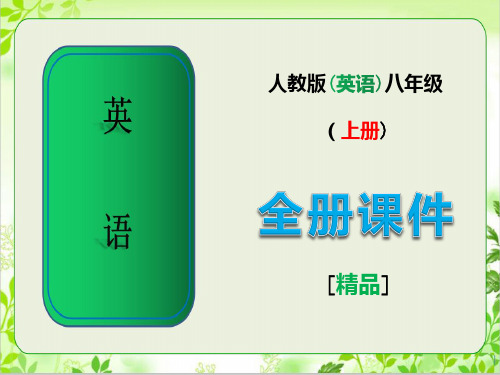人教版8年级英语上册 Unit 2 Period 2
人教版八年级英语上册第二单元课件

The results for “watch TV” are interesting.
_S_o_m__e students watch TV once or twice a week,
s_tio_m_me_es_
students watch TV __t_h_r_e_e__ _o_r_ _f_o_u_r__ a week, but most students watch _e_v_e_ry_
Do you know?
• sometime 某个时间 • some time 一段时间 • sometimes 有时 • some times 几次
I sometimes go to school by bus. I will go to America sometime this year.
人教版初中英语 八年级上册教学课件
Unit 2 How often do you exercise?
Section A Period 1
Are you healthy?
Do you often drink milk? Do you eat fruit and vegetables everyday? Do you often do your exercise?
2020秋人教版八年级上册英语全册完整课件

A: Where did … go on vacation? B: ...
went to the beach
A: Where did … go on vacation? B: ...
stayed at home
2a Listen. Where did the people go on vacation? Complete the chart.
anyone 任何人 each 每个
个
anything 任何 事物
no 无 nobody 无人
every 每个
nothing 无物 all 全体;全部 both 两个(都) none 没人或物 (指两个以上)
other(s) 另一个 (些) another 另外一 个;又一个 much 很多
many 很多
neither 没人或物
(指两个当中)
anybody 任 few 一些;几
Where did you go on vacation?
visited museums
Where did you go on vacation?
went to summer camp
1a Match the activities with the pictures [a-g].
Where did you go
do anything
✔
Julie interesting?
study for tests? ✔
go out with anyone?
✔
Talk about your vacation plans with your friends and fill in the chart.
Name Vacation plans Who? When?
人教版八年级英语上册说课稿《UNIT2Period4(SectionB2a-2e)》

人教版八年级英语上册说课稿《UNIT 2 Period 4 (Section B 2a-2e)》一. 教材分析人教版八年级英语上册Unit 2 Period 4涵盖了Section B 2a-2e的内容。
这部分教材主要介绍了关于不同国家节日和庆祝方式的话题。
通过本节课的学习,学生能够了解和掌握一些与节日相关的词汇和表达方式,同时提高他们的阅读和写作能力。
二. 学情分析八年级的学生已经具备了一定的英语基础,对于日常生活中的基本词汇和句型已经有了一定的了解。
但是,对于一些特定的文化背景和表达方式可能还比较陌生。
因此,在教学过程中,需要注重培养学生的文化意识,提高他们的语言运用能力。
三. 说教学目标1.知识目标:学生能够掌握与节日相关的词汇和表达方式,了解不同国家的节日习俗。
2.能力目标:学生能够通过阅读和写作,运用所学知识进行实际交流。
3.情感目标:培养学生对不同文化的尊重和理解,提高他们的跨文化交际意识。
四. 说教学重难点1.重点:学生能够掌握与节日相关的词汇和表达方式,了解不同国家的节日习俗。
2.难点:学生能够运用所学知识进行实际交流,尤其是写作能力的培养。
五. 说教学方法与手段1.任务型教学法:通过设定各种真实的任务,让学生在完成任务的过程中学习和应用知识。
2.交际型教学法:通过模拟真实的交际场景,让学生在实际交流中提高语言能力。
3.多媒体教学手段:利用多媒体课件和网络资源,丰富教学内容,提高学生的学习兴趣。
六. 说教学过程1.导入:通过展示一些节日的图片,引导学生谈论他们喜欢的节日,激发学生的学习兴趣。
2.读前活动:让学生预测文章内容,激活他们的背景知识。
3.阅读活动:让学生阅读文本,回答相关问题,帮助他们理解文章内容。
4.读后活动:让学生进行小组讨论,分享他们的阅读心得,培养他们的交际能力。
5.写作活动:让学生根据所学内容,写一篇关于节日的短文,提高他们的写作能力。
七. 说板书设计板书设计要简洁明了,突出重点。
人教版八年级英语上册课件:Unit2 Period 2

On my visit to Australia, I feel Australians C are similar ______ us in many ways. A. with B. in C. to D. at — Can you tell the differences between these two pictures? — Differences? Oh, no. They look quite B ______. A. different B. similar C. strange D. interesting
在表示同一意义时,英语感叹既可用“what”引导, 也可用“how”引导。如: ① What a hot day it is! How hot the day is ! 多么热的天气呀! ② What tall buildings they are! How tall the buildings are! 多么高的楼房呀! ③ What bad weather it is! How bad the weather is! 多么糟糕的天气呀! ④ What bright sunshine it is! How bright the sunshine is! 多么明亮的阳光呀!
5. be similar to 跟 ... 类似的; 与 ... 同 样的
My problems are very similar to yours. 我的问题与你的差不多。 His dress is very similar to mine in colour. 他衣服的颜色和我衣服的很相似。 be similar to 的反义短语是be different from …(与……不同)
由“what”引导的感叹句:修饰名词(被强调部分), 单数可数名词前要加不定冠词a/an,复数可数名词或不可数名词 前不用冠词。句子的结构是:
人教版八年级上学期英语课件:unit 2 Section B(1a-2b)(共41张PPT)

5.How often do you eat junk food?
2 or 3 times a week
6.How often do you drink coffee? never
Bill hardly ever
Junk food is bad for our health.
1a Match the words with the pictures.
a
b
c
d
e
f
Check the answers!
1. __b__ junk food 2. ___a__ milk 3. __e___ fruit 4. __c___ vegetables 5. __f___ sleep 6. __d___ coffee
教学课件
英语 八年级上册 人教版
Unit 2 How often do you exercise?
Section B The Third Period 1a-2b
课前自主预习
1. 垃圾食品 __j_u_n_k__fo_o_d___ 2.对……有好处 ___b_e_g_o_o_d__fo_r_ 3.喝咖啡 _d_r_i_n_k_c_o_f_f_e_e_ 短语互译 4.去野营 __g_o_c_a_m__p_i_n_g_ 5.在某人的空闲时间
2.although conj.虽然;尽管;即使。引导让步状语从句。
Although/Though it was so cold,he went out without an overcoat.尽管天气很冷,但他还是没有穿大衣就出去了。 【注意】 although=though用作连词,意为“虽然,尽 管”,这两个词都不能与but连用,即用了although/though 就不能再用but。不过although可以与yet/still一起使用。 尽管他身体不好,但是他工作很努力。 正:Although/Though he is in poor health,he works hard. 正:He is in poor health,but he works hard. 误:Although he is in poor health, but he works hard.
人教版八年级上册英语-unit1-2教案

Unit 1 How often do you exercise?Period 1 New words learningTeaching Aims:1. Make students pronounce the words correctly.2. Make students recite the new words with Chinese meanings.Teaching procedure:1. Daily greeting2. Show teaching aims3. Teacher guides students to learn the new words.Step 1 T: Please read the new words in Unit one by yourself. Let us see who can pronounce the words best and who can read the most words. I will give you 10 minutes to do that. After that, I will ask some students to read the words.Ss learn by themselves:1. Ask Ss to read the new words by themselves by using the international alphabet.2. Make Ss listen to the tape and check if they can read the words correctly. Underline the words which they cannot pronounce or pronounce correctly.Teacher teaches:Teacher play the recoding and ask student check their pronunciations according to the tape.Step 2 T: Now you please read the words by yourselves. I will give you 10 minutes and then I will check your work.Ss learn by themselves:1. Ss read the new words, the teacher walk around the classroom and check if the Ss can read the words well.2. The teacher shows the new words on the blackboard, Ss close books and check by themselves then check with their deskmates.Teacher teaches:Check the pronunciations especially the poor students. And teacher should teach the difficult words.Step 3 T: Remember the new words. I will give you 15 minutes.Ss learn by themselves:1. Ss remember the new words2. Ss can use different ways to remember the new words.Teacher teaches:Teach some difficult words.4. Practice in classHave a dictation and ask Ss to write the new words on the exercise books.Teacher checks.Period 2 Section A(1a-2c)Teaching Aims:1. Grasp the main sentences and impressions in this period.2. Use the sentences to talk about how often you do things.Teaching procedureStep1. Daily greeting and show teaching aims. (1’)Step 2 PresentationComplete Activity 1a. (6’)1. First let the Ss discuss the picture and then ask the students to make a list of the different weekendactivities2. Next let two students talk about their own weekend activities and them tell their activities.3. Finally the teacher writes the activities on the blackboard. Teach them and let the students read loudly. Step 3 Listening practice. (8’)1. Listen to 1b twice. Write the letters from the picture. After listening ,learn the 6 words and introducethese words.2. Listen again and repeat loudly.3. Ss read loudly the listening materials for 3 minutes.Step 4 Present conversations.(5’)1. Read the conversation in pairsA: What do you usually do on weekends? B:I usually go to the movies.A: How often do you watch TV? B:I watch TV once a week .2. Make the new conversations.Step 5 Listening practice. (8’)1. Listen to 2a and 2b twice. First number the activities , then match the activities with the number of times.2. Listen again and repeat loudly (open)3. Ss read loudly the listening materials for 3 minutes.Step 6 Presentation(5’)Do Activity 2c.First let the Ss fill in the chart,then make their own dialogues according to the given conversation.Step 7 Class exersices:1)--____do you help the old man with the housework? --Once a week.A. How soonB. How longC. How oftenD. How many2) My mother _______surfs the Internet. She likes watching TV.A. doesn't hardly everB. hard everC. isn't hardly everD. hardly ever3) What are the _______ of your exams? A. answers B. problems C. results D. things4) -----What does she do on ________? -----She often go to the movies.A. Every weekB. a weekC. weekendD. weekends5) -------______do you do sports? --------I do sports every day.A. WhenB. What timeC. How longD. How often教學反思:Period 3 Section (3--4)Teaching Aims:1. Understand the main idea of this article.2. Learn to use the new words and expressions to talk about how often people do things.Teaching procedureStep 1. Daily greeting and show teaching aims. (1’)Step 2. Read the article carefully and fill in the blanks.(5’)Step 3. Read the passage again and underline some important words.(5’)Step 4. Read loudly alone for about 4 minutes. (4’)Step 5. Retell or recite (10’)Step 6. Discuss language difficulties in group to help each other.(5’)1. Discuss in groups2. Discuss in class3. The teacher explains.Step 7 Speaking and writing activities. (5’)Interview in groups and fill in the chart, then find out who is the best English student?Write a passage according to the filled chart.Step 8. Class exercisesA)根據句意,用括號內所給詞の適當形式填空。
新版人教版 八年级上Unit 2 how often do you exercise Section A-2a-2d ppt课件
Jack: What kind of dance are you learning?
35
2d Role-play the conversation.
PPT课件
36
Read the passage and answer the questions below.
1. Who is busy next week? 2. what kind of dance is she learning ? 3. How often does she have dance class? 4. How often does she have piano lessons? 5. What is she doing on Tuesday?
每天/每夜
• once a week / month
一周/一个月一次
• twice a week / month
一周/一个月两次
• three times a week / month 一周/一个月三次
• once or twice a week / month 一周/一个月一 次或两次
PPT课件
27
once a day / a week / a month / a year twice a day / a week / a month / a year
PPT课件
15
How often do you do these activities?
do homework Every day
A: How often do you do your homework? B: I do my homework every day.
PPT课件
13
How often do you …? does he / she …?
高分突破人教版八年级上册unit 2---Period 2训练案(课本P11~P12)
my health.
C.is good for D.are good for
返回
英语
( C )7.—How often does your sister stay up late?
—
.She always goes to bed early.
A.Sometimes B.Once a week C.Never D.Twice a week
.
A.8:00 a.m. B.9:30 a.m. C.10:00 p.m. D.12:00 p.m.
( B )20.Which costs the most for an adult? A.Keeping fit at Nancy’s Gym. B.Skating in Ice World.
C.Swimming in Water World. D.We don’t know.
Unit 2 How often do you exercise?
Period 2训练案(课本P11~P12)
英语 一、单项填空。
( B )1.You must eat more vegetables and keep
A.health B.healthy C.thin D.fat
( A )2.Exercise is good for our
.
A.health B.healthy C.mind D.head
.
返回
英语
( C )3.Susan is a kind girl.She often helps me A.at B.in C.with D./
( A )4.Mary
gets up early,so she is
school.
【人教版】八年级英语上册 Unit 2 全单元英文教案
Unit 2 How often do you exercise?Language Goal 【语言目标】Talk about how often you do things:in this unit,students learn to talk about what things they do and how often they do these things.Knowledge Goals 【知识目标】Key Wordshousework,hardly,ever,once twice,full,maybe,least,junk,coffee,health,percent,online,although,through,mind,body,such,together,die,writer,dentist,magazine,however,than,almost,less,pointKey Phraseshow often,on weekends,go to the movies,hardlyever,twice a week,three times a week,be goodfor,at least,such as,less than,more than Key Sentences1. How often do you exercise?2.What do you usually do on weekends?Key Grammar1. The use of adverbs of frequency.2.“How often” cause of special questions andanswers.Ability Goals 【能力目标】1. Through the learning to gain the ability to talk about how often people do things.2.Write a report about how often people do things.Moral Goals 【情感目标】1. Keep a diary every day.2.Do more exercise and develop good habits to keep healthy.Teaching Time 【课时】Five periodsPeriod 1 Section A(1a-2d)Period 2 Section A(Grammar Focus-3c)Period 3 Section B(1a-1e)Period 4 Section B (2a-2e)Period 5 Section B (3a-Self Check)本单元的教学内容围绕“多久做一次运动”这一话题展开。
人教版八年级英语上册教学设计《UNIT 3 Period 2 (Section A 2d-3c)》
人教版八年级英语上册教学设计《UNIT 3 Period 2 (Section A 2d-3c)》一. 教材分析人教版八年级英语上册Unit 3主要围绕“过去发生的事情”展开,Period 2(Section A 2d-3c)以故事的形式呈现了一个关于两个孩子和他们的父母去野餐的情景。
本节课的主要语言点是过去式的动词运用,以及如何描述过去发生的事情。
教材通过丰富的图片和情景设定,让学生在真实的语境中学习和运用英语。
二. 学情分析八年级的学生已经掌握了基本的英语语法和单词,具备一定的听说读写能力。
但部分学生对过去式的动词运用还不够熟练,尤其是在实际语境中运用。
因此,在教学过程中,教师需要注重引导学生理解和运用过去式,同时激发学生的学习兴趣,让他们在轻松的氛围中学习英语。
三. 教学目标1.知识目标:学生能够熟练运用过去式描述过去发生的事情。
2.能力目标:学生能够在真实语境中运用英语进行交流。
3.情感目标:培养学生热爱生活,珍惜与家人相处时光的情感。
四. 教学重难点1.重点:学生能够运用过去式描述过去发生的事情。
2.难点:学生在实际语境中灵活运用过去式。
五. 教学方法1.情境教学法:通过设定情境,让学生在真实的环境中学习和运用英语。
2.任务型教学法:通过完成任务,培养学生实际运用英语的能力。
3.游戏教学法:通过趣味游戏,激发学生的学习兴趣。
六. 教学准备1.教学课件:制作包含图片、文字和动画的课件,生动展示教学内容。
2.野餐场景道具:准备与野餐相关的实物道具,如食物、饮料、毯子等。
3.任务卡:制作任务卡,引导学生进行小组活动。
七. 教学过程1.导入(5分钟)教师展示野餐场景的图片,引导学生谈论他们和家人一起去野餐的经历。
2.呈现(10分钟)教师通过课件呈现故事情节,引导学生关注故事中人物的过去行动。
同时,教师讲解过去式的动词运用。
3.操练(10分钟)教师学生进行角色扮演,让学生模拟故事中的情节,运用过去式进行交流。
- 1、下载文档前请自行甄别文档内容的完整性,平台不提供额外的编辑、内容补充、找答案等附加服务。
- 2、"仅部分预览"的文档,不可在线预览部分如存在完整性等问题,可反馈申请退款(可完整预览的文档不适用该条件!)。
- 3、如文档侵犯您的权益,请联系客服反馈,我们会尽快为您处理(人工客服工作时间:9:00-18:30)。
(Unit 2 How often do you exercise?)
Period 2(2a-2d)
Teaching aims(教学目标)
1.学会谈论自己和询问他人做事情的频率。
2.学会邀请和接受或拒绝别人周末活动。
Language points(语言点)
1.要求掌握以下句式:What does she usually do on weekends?
He usually watches TV.
How often does he go shopping?
He hardly ever goes shopping.
2.要求掌握以下词汇及短语:
once, twice, Internet, full, swing dance, maybe, at least, once a week, twice a month, three times a week, how come
Difficulties(难点):正确描述不同人称的活动频率。
Teaching steps(教学步骤)
1. Review & Lead in
T: I often read on weekends. What do you usually do on weekends, Lisa?
S1: I usually watch TV on weekends.
T: What does Lisa usually do on weekends, Lucy?
S2: She usually watches TV. Do you often watch TV, Tom?
S3: ...
S4: …
教学设计说明:通过推火车式轮回对话,复习了上节课的重点句型和短语,也为下面完成听力内容做好铺垫。
2. Work on 2a
Present the new words and phrases on the screen to the class (twice a week, once a month, three times a day).
T: I watch TV only on Saturday and Sunday. So I can say I watch TV twice a week.
(教师把这些新词和短语写在黑板上并且领读一遍。
)
Have Ss get into pairs and make their own conversations about how often they do things. You can use the two examples on the screen to help them.
T: Now, Cheng Tao is talking about how often he does these activities. Listen and number the activities [1-5] in the order you hear them.
Answers: a. 3, b. 1, c. 5, d. 4, e. 2
教学设计说明:听力前的铺垫对降低听力难度有很大帮助,因此听完回答2a应该不难。
,
一遍完全可以完成任务。
3. Work on 2b
T: Listen again. Match the activities in 2a with how often Cheng Tao does them.
4. Pair work
Work on 2c
T: Get into pairs and fill in the form. Then, make your own conversations.
A: How often do you watch TV?
B: I watch TV every day.
A: What’s your favorite program?
B: It’s Animal World.
A: How often do you watch it?
B: Once a week.
教学设计说明:进一步巩固本节课所学内容,让学生在讨论、听的基础上学会谈论自己和询问他人做某事的频率。
5. Role-play
Look at 2d on page 10 and role-play the conversation with your partner.
Give Ss 5 minutes to prepare. Then ask a few pairs to present their conversation to the class.
6. Homework
Oral:
Read 2d on page 10 and change the words used to make a new conversation.
Written:
Copy the sentences in Grammar Focus on page 11.
教学设计说明:鼓励学生在模仿的基础上编自己的对话,创造性的利用课本知识。
语法聚焦是一个单元比较重要的知识点,通过抄写一遍并翻译,学生加深了对重点知识的理解。
every day once a week twice a week three times a week once a month twice a month go to the movies
watch TV
shop
exercise
read。
